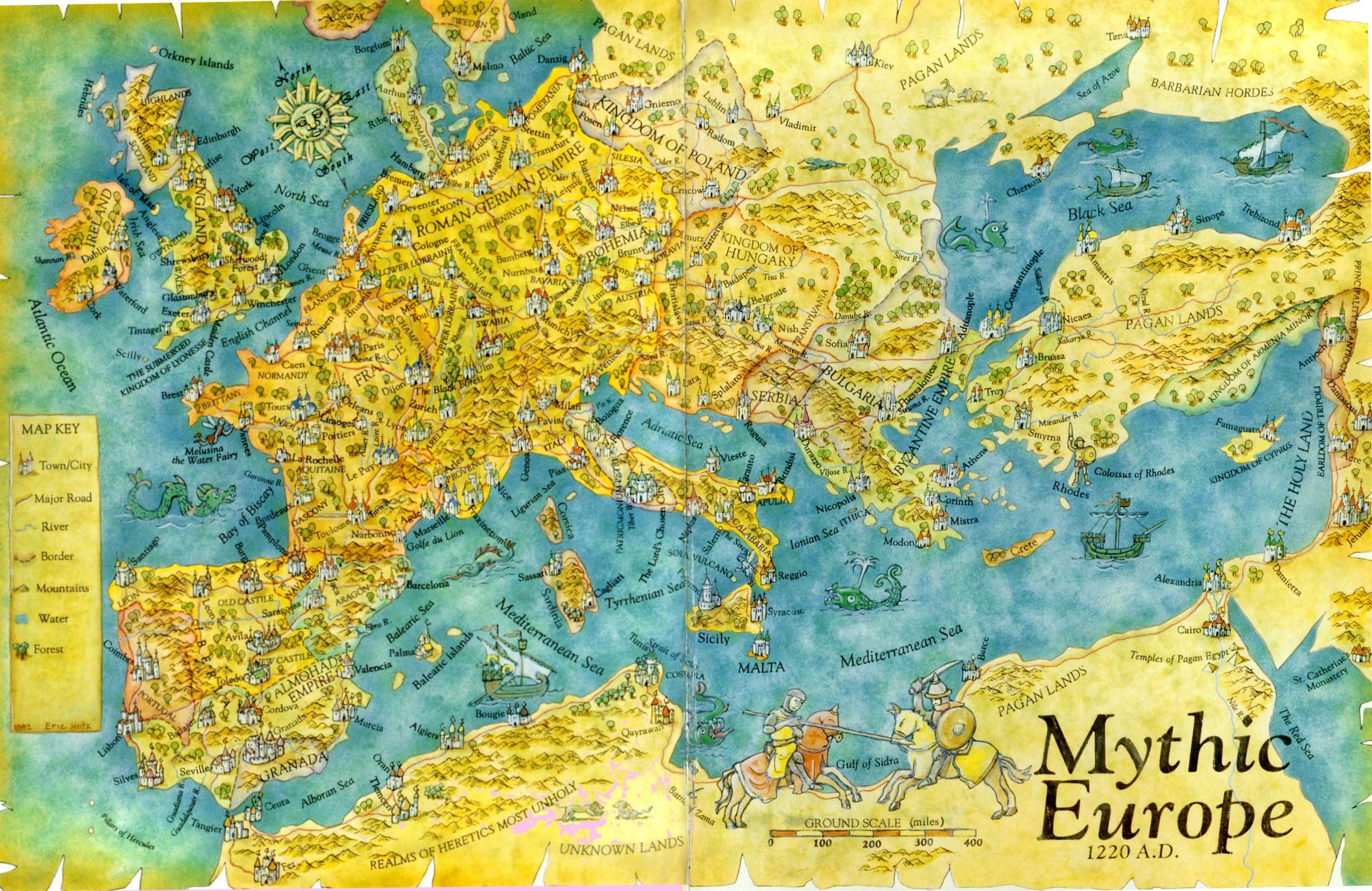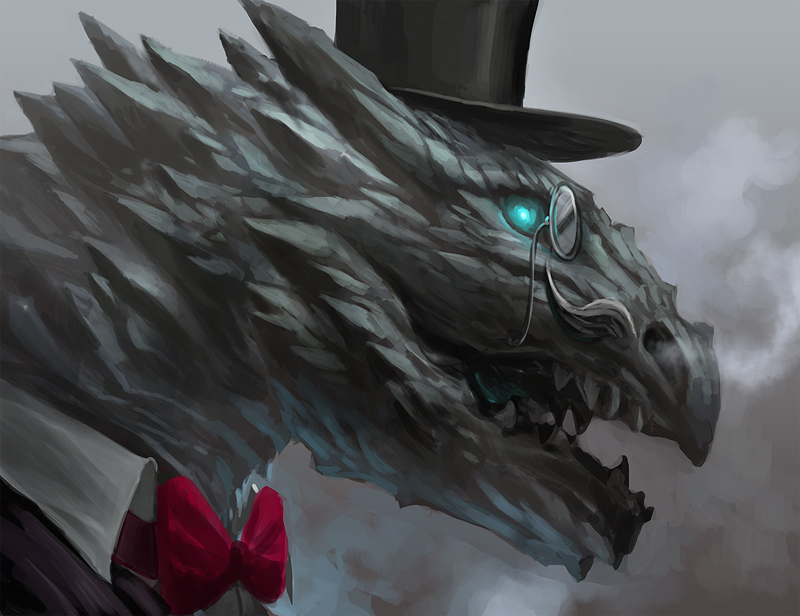OSSR: Ars Magica
Chapter 14: Mythic Europe
 This is from an earlier edition of Ars Magica where the Muslims were just treated as filthy pagans. In 5th edition, North Africa is labeled “Moorish Lands.”
This is from an earlier edition of Ars Magica where the Muslims were just treated as filthy pagans. In 5th edition, North Africa is labeled “Moorish Lands.”
This section is twelve pages and talks to you about the default setting, which is supposed to be “13th century Europe, with magic.” Of course, if that's all there was, you wouldn't need twelve pages or even twelve
sentences. I just got that idea over in one sentence, and the book does too. It's a pretty self explanatory concept. Indeed, it's generally assumed that Ars Magica was originally set in “actual Europe, but with magic” because that was
easy. They didn't have to do any real world building, and they didn't. But there's another reason to use the actual world, which is that it has a shit tonne of source material for it. Like,
all the source material. Ever. There's a reason that the two most lastingly influential games of 1989 were
both set in “Earth, but with magic” (Shadowrun being set in the 21st century, and Ars Magica being set in the 13th). All the places are places people care about, all the cities are places people have heard of, any part of the map you want to visit has as much source material on it as you care to read. You can get people invested into the setting quickly, and the burden on the authors of the game to produce all the world material people need is considerably lessened.
So what the author's job here should have been is to get across to the reader how the world of Ars Magica is different from real history. After all, our Earth didn't have covenants supporting members of the Order of Hermes in their arcane research nor did it have gateways to fairielands opening up in the woods. So you might think you were in for a condensed secret history of how the King of Hungary is a vampire and the Albigensian Crusade was called because Pope Innocent III really hated Occitanian witches. And this is really the book's opportunity to connect the magic rules they've been talking about and historical reality that you can look up on wikipedia.
 This opportunity is missed.
This opportunity is missed.
What this book presents instead is mostly the author's opinion stated over and over again that you should research historical details for your campaign as long as it is fun, and then make up details when it wouldn't be fun to look this shit up. Which is great advice for
playing the game, but really honestly seems like the way the author went about
writing the game, which is less cool. When the author says “If historical accuracy is spoiling your fun, you need less of it.” it feels like he's justifying his own slacking off when it comes to getting things accurate in their own work. When he tells you to follow your bliss and focus on medieval historical details that interest you and ignore shit you don't like, that's
great advice for
a game and
terrible advice for
the game. This is pretty good DM advice, and atrocious shared world author advice, and I think it got used for both things.
Five pages of this thing are dedicated to ranting about the Church. The fact that the Church has in fact schismed during this period and
there are two fucking Churches does not get mentioned. The fact that at this moment in time there are entire cities given to the heresy of the Cathars and Christians are killing Christians over doctrinal differences by the tens of thousands. And yet, rather than discuss these issues at all, we get 332 words squandered on telling us “Christian” doctrine:
Ars Magica, 5th Edition wrote:There is one God, eternal and unchanging, who created the world from nothing and sustains it from moment to moment. This God is three persons, the Father, Son, and Holy Spirit. The Son became a human being as Jesus Christ, an event called the “Incarnation,” which is considered the most important event in history. Jesus Christ died on the cross, the Crucifixion, and by his death paid the penalty for all the sins committed by human beings. On the third day, he rose from the dead, in the Resurrection, and forty days later he ascended to heaven.
In the beginning, God created two humans, Adam and Eve, and placed them in the Garden of Eden. There, they were tempted by Satan and sinned, and this Original Sin tainted all of their descendants. Where once all of nature had served humankind, now it turned against them. Human beings in Original Sin can do nothing truly good, because their motives are always tainted. Baptism washes away that stain, and fits a person to receive God’s grace, which grants the ability to do good.
Good acts are those which accord with God’s will, and tend to His glory, while evil acts are those which do not. The seven deadly sins are the basic roots of almost all sins committed by human beings, and the Church warns against them in particular. They are Avarice, Envy, Greed, Lust, Pride, Sloth, and Wrath. On the other side, there are the three theological virtues: Faith, Hope, and Love, and the greatest of these is Love.
All humans have an immortal soul, created at some point before birth. (In 1220, theologians still disagree about when.) After death, the soul is judged by God. Those who die perfect, having done penance for all their sins, pass directly into heaven. Those who die penitent, but not yet perfect, pass to purgatory, where they do penance after death for all those sins remaining. Those who die impenitent are condemned to hell for eternity.
I'm not making that up. It's in there. There is no context for it. That is a complete subsection all to itself, precisely as it appears in the book. It doesn't make sense, and it's very nearly actual dogma for some flavors of Christians. That isn't even the end of this shit, in that the next subsection is a rant about the sacraments. I feel like I'm reading something by Dave Sim. We don't get any discussion of how the secret history is different from real history, but we do get a description of the beliefs of
Christians. Because obviously there's no way we could just look
that shit up. There's some rants about using Christian trappings as things to care about in games, but honestly
what the fuck is going on?
 The author really seems to think that the trinity is obscure information. Either that or he's proselytizing.
The author really seems to think that the trinity is obscure information. Either that or he's proselytizing.
The other estates get less ink. The Nobility get two pages, and the Cities and Towns get a page and a half. These sections get subsections on “mythic options” but they are almost unbelievably bullshit. Just a notice that a lord or town
could have links to faeries or other supernaturals. Not which ones do in the default setting or what the actual fuck – just a note to the Storyguide that the magic can be played up or down, you know,
whatever. So much ink is spilled on reminding the Storyguide that the setting can be changed, that they never quite get around to saying what the setting actually is.
The last little bit is a rant about peasants. This is the only part where they really commit to anything setting-wise, and it's completely batshit insane. Apparently,
all the peasants have supernatural shit in their lives, and it is completely normal for regular farms to have magic trees and people talk to the wolves in the forest and villages make formal treaties with the forest beasts like they were living in fucking Equestria. This is MYTHIC europe, not Mythic Europe. Things in the author's description are gonzo on a level that most D&D campaigns don't reach. Galt in Golarion is more recognizable as historical France than the 5th edition presentation of Ars Magica France is. It's quite an accomplishment.
At least there's a map. But since the map is just a map of Europe in 1220, you can just google that shit.
 Or start a game of Crusader Kings 2 in 1220.
Chapter 15: Stories
Or start a game of Crusader Kings 2 in 1220.
Chapter 15: Stories
 We can't bust heads like we used to, but we have our ways.
We can't bust heads like we used to, but we have our ways.
This chapter is only 5 pages long. It starts on page 211, and by 215 it's over. It doesn't even fill that last page, there's just two ectopic pieces of box text and some white space.
While the chapter is incredibly spare, it covers a fair amount of ground. We don't see it wander off on half page tangents about Christian dogma like the last chapter! This chapter actually
raises a bunch of good points. Political conflicts are good problems for powerful characters because they can't usually be solved with a simple spell or a well placed dagger. How “soap opera” inherently scales to character power or lack thereof. And so on. But these issues aren't so much
addressed as merely
raised. This looks like the collected notes to write a chapter about telling stories in Ars Magica rather than an actual chapter that had been completed.
Ars Magica 5th edition wrote:• Other Covenants. Magi are expected to give hospitality to visiting magi, even if they turn up uninvited. Getting to know your neighbors is a good idea, provided you can avoid upsetting them.
Seriously, that's the whole idea: just those two sentences in a bullet point. The implied expansion into a paragraph or subsection never happened.

There's not a lot to condemn or make fun of here because there just isn't a lot
here. The truth is that Ars Magica
does have a lot of stories to tell. It has a large ensemble cast who span a large collection of different power levels and the most detailed setting it is possible for a fantasy game to have. Europe at the time is a land filled with wars internal and external. There are wars against the Egyptians and Estonians without and wars against the Cathars and between the nobles of Champagne within. The main characters are witches and the friends and allies of witches who live in countries that officially have a zero tolerance policy on witches. There's setting, characters, conflict, and goals –
stories can happen.
The chapter's missions should have been to provide challenge guidelines or something that a person couldn't replicate by sitting in the bathtub and thinking about possible story hooks for Ars Magica until you got out. Instead, it gives some fortune cookie wisdom and some bullet point ideas. It's not
bad, but it doesn't really go into much detail. If this chapter was as-is in a 70 page rules-lite game, I wouldn't have a problem with it. As is, it looks like this a chapter outline rather than an actual chapter.
Chapter 16: Sagas
 Let's hope we have a slightly better saga.
Let's hope we have a slightly better saga.
This chapter is the one we were directed to for more information about “Troupe Play,” which I remind you is the central innovation of this game and pretty much the only reason we still talk about it rather than forgetting about it like it was Powers & Perils or something. This entire chapter is only 7 pages, so... not likely.
Ars Magica 5th Edition wrote:Perhaps the most obvious question concerns how much history you want to use, and how close to historical events you want to stay. Some troupes like to keep mundane history the same as real history, and have the Order of Hermes acting entirely behind the scenes. Others prefer to have the magi change things, so that political events look very different from our history. Still others prefer to change things around entirely.
Basically, the author spends so much time in these last few chapters reminding you that you can change the setting that he forgets to
write a setting. This book is a hard bound Page 42 Fallacy. These “maybe you want to do it differently?” suggestions take up five and a half pages of this chapter, leaving only a page and a half to describe the central game structure. Because the author has no idea what is important and what is not. Telling people that they could make up some rules to do The Magic Goes Away if they wanted to do that instead of playing Ars Magica is
not important, while telling people how to play the actual fucking game
is. Fuck.
The actual advice on running a troupe game is actually placed into the narrative of giving you
options. You know, like the entire rest of the chapter is wasted on doing. However, this time they are actually suggesting a solid baseline from which to deviate, which makes such discussion modestly helpful. Hell, I'll just go ahead and quote a bit from their discussion of pooled characters:
Ars Magica 5th edition wrote:This has a number of advantages. First, the number of magi in a group tends to be small, which makes them easier to challenge. Second, the covenant staff get to appear on stage, without condemning anyone to playing bit parts all the time. Third, when playing a grog you can cut loose and enjoy yourself. If you overact and ham up your main character, you are likely to end up annoying the other players. On the other hand, a grog who is hammed up can be restricted to small doses, making him entertaining rather than annoying.
That's true. And it's insightful. We don't really get to the downsides of this setup, because the author thinks he has to sell you on troupe play as a thing to switch to
while playing Ars Magica rather than just laying down the fucking law and saying this is how it's done. And since there is only a page and a half on this subject, there really isn't room to get in to issues of characters who have less screen time being inherently less fleshed out or player/character alienation or any of that stuff.
And that's the end of the book's chapters. There are two appendices, one of which is given to ranting at 4th edition players about what to expect. This doesn't even bother to call out major changes like “armor based burden doesn't penalize your defense anymore so wearing armor is good rather than bad” but instead calls out incoherent gibberish like how they reworded the trait definitions of Muto so that it makes no sense in a different way. The second appendix is a collection of all the math formulas that were put into bold font earlier in the book. These are totally without context and obviously collected by a computer. It's just so fucking useless that I have no idea why that's even here.
Then there's the index, which is also automatically generated by a computer and essentially useless. Then the book is over. I'll post my final thoughts tomorrow some time.










